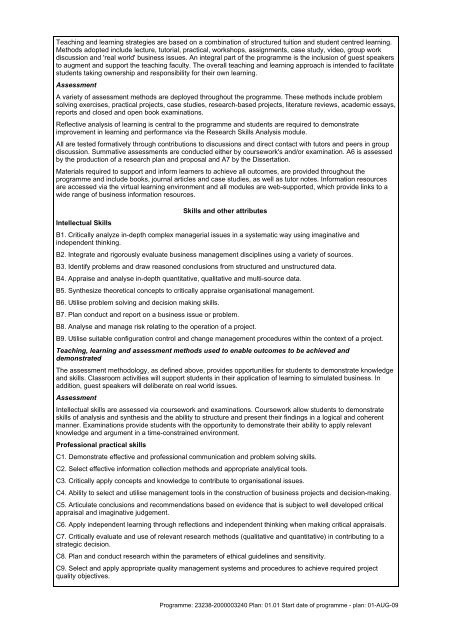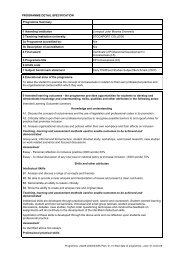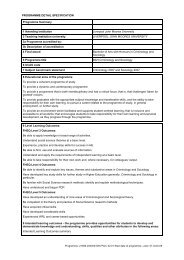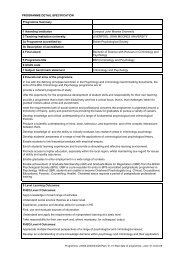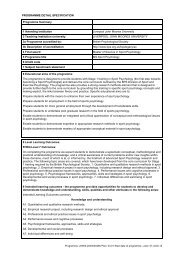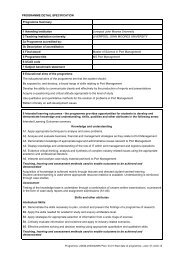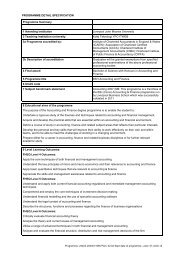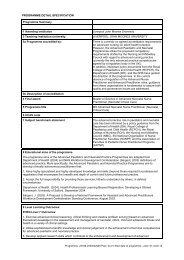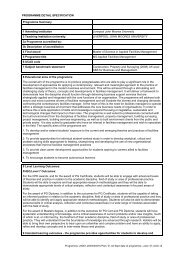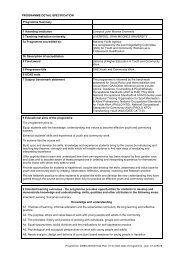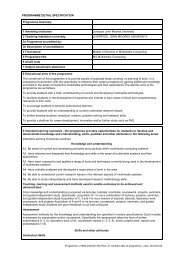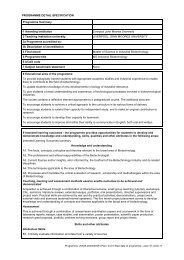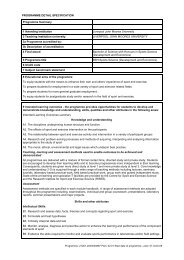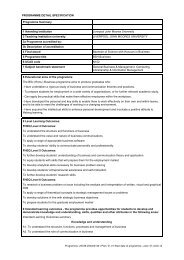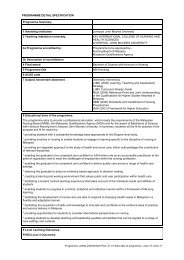Project Management - Liverpool John Moores University
Project Management - Liverpool John Moores University
Project Management - Liverpool John Moores University
You also want an ePaper? Increase the reach of your titles
YUMPU automatically turns print PDFs into web optimized ePapers that Google loves.
Teaching and learning strategies are based on a combination of structured tuition and student centred learning.<br />
Methods adopted include lecture, tutorial, practical, workshops, assignments, case study, video, group work<br />
discussion and 'real world' business issues. An integral part of the programme is the inclusion of guest speakers<br />
to augment and support the teaching faculty. The overall teaching and learning approach is intended to facilitate<br />
students taking ownership and responsibility for their own learning.<br />
Assessment<br />
A variety of assessment methods are deployed throughout the programme. These methods include problem<br />
solving exercises, practical projects, case studies, research-based projects, literature reviews, academic essays,<br />
reports and closed and open book examinations.<br />
Reflective analysis of learning is central to the programme and students are required to demonstrate<br />
improvement in learning and performance via the Research Skills Analysis module.<br />
All are tested formatively through contributions to discussions and direct contact with tutors and peers in group<br />
discussion. Summative assessments are conducted either by coursework's and/or examination. A6 is assessed<br />
by the production of a research plan and proposal and A7 by the Dissertation.<br />
Materials required to support and inform learners to achieve all outcomes, are provided throughout the<br />
programme and include books, journal articles and case studies, as well as tutor notes. Information resources<br />
are accessed via the virtual learning environment and all modules are web-supported, which provide links to a<br />
wide range of business information resources.<br />
Intellectual Skills<br />
Skills and other attributes<br />
B1. Critically analyze in-depth complex managerial issues in a systematic way using imaginative and<br />
independent thinking.<br />
B2. Integrate and rigorously evaluate business management disciplines using a variety of sources.<br />
B3. Identify problems and draw reasoned conclusions from structured and unstructured data.<br />
B4. Appraise and analyse in-depth quantitative, qualitative and multi-source data.<br />
B5. Synthesize theoretical concepts to critically appraise organisational management.<br />
B6. Utilise problem solving and decision making skills.<br />
B7. Plan conduct and report on a business issue or problem.<br />
B8. Analyse and manage risk relating to the operation of a project.<br />
B9. Utilise suitable configuration control and change management procedures within the context of a project.<br />
Teaching, learning and assessment methods used to enable outcomes to be achieved and<br />
demonstrated<br />
The assessment methodology, as defined above, provides opportunities for students to demonstrate knowledge<br />
and skills. Classroom activities will support students in their application of learning to simulated business. In<br />
addition, guest speakers will deliberate on real world issues.<br />
Assessment<br />
Intellectual skills are assessed via coursework and examinations. Coursework allow students to demonstrate<br />
skills of analysis and synthesis and the ability to structure and present their findings in a logical and coherent<br />
manner. Examinations provide students with the opportunity to demonstrate their ability to apply relevant<br />
knowledge and argument in a time-constrained environment.<br />
Professional practical skills<br />
C1. Demonstrate effective and professional communication and problem solving skills.<br />
C2. Select effective information collection methods and appropriate analytical tools.<br />
C3. Critically apply concepts and knowledge to contribute to organisational issues.<br />
C4. Ability to select and utilise management tools in the construction of business projects and decision-making.<br />
C5. Articulate conclusions and recommendations based on evidence that is subject to well developed critical<br />
appraisal and imaginative judgement.<br />
C6. Apply independent learning through reflections and independent thinking when making critical appraisals.<br />
C7. Critically evaluate and use of relevant research methods (qualitative and quantitative) in contributing to a<br />
strategic decision.<br />
C8. Plan and conduct research within the parameters of ethical guidelines and sensitivity.<br />
C9. Select and apply appropriate quality management systems and procedures to achieve required project<br />
quality objectives.<br />
Programme: 23238-2000003240 Plan: 01.01 Start date of programme - plan: 01-AUG-09


